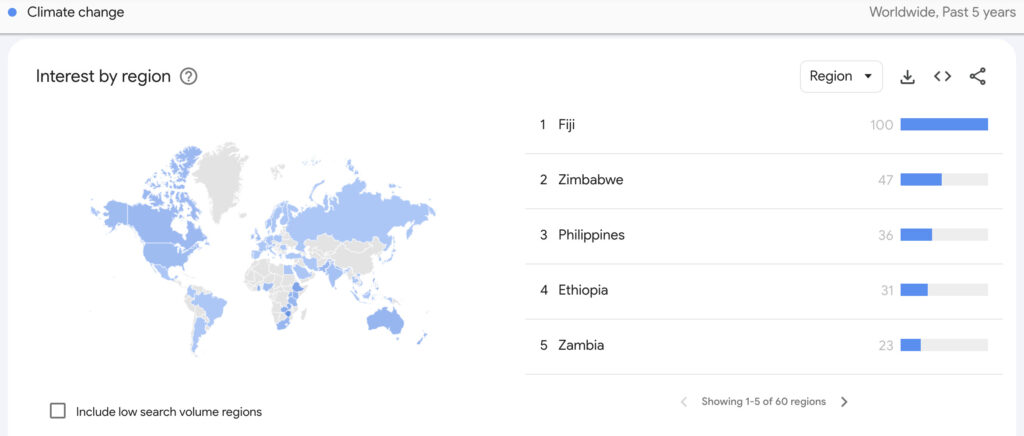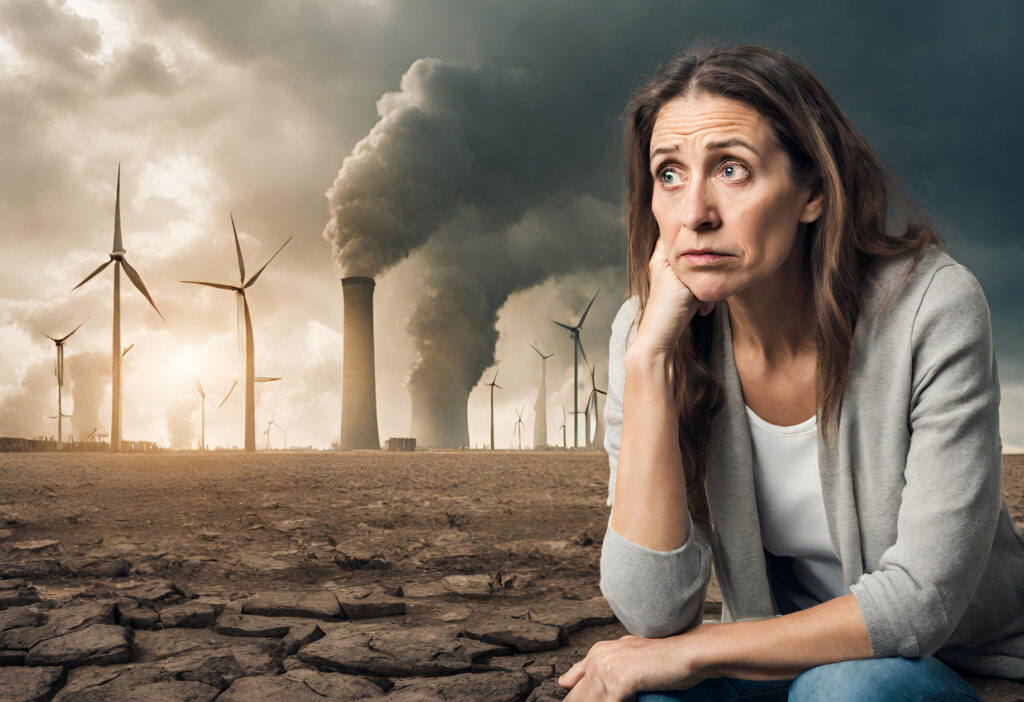5 Mins Read
Google data shared with BBC 100 Women has shown that online searches for terms related to climate anxiety have significantly increased over the last five years. In addition, separate research has revealed that women are more starkly affected by eco-anxiety.
We’re approaching COP28 next week, where global leaders will converge to discuss solutions to the climate crisis. In the lead-up to the UN climate summit, a host of reports have been published, which show the lack of efforts being made to curtail climate change, and how devastating it will be if we don’t step up now.
In fact, when writing about one of these reports this week, I felt very uneasy. Particularly about the fact that we as a planet are on course to reach temperature rises of 3°C above pre-industrial levels – double the 1.5°C limit mentioned in the Paris Agreement. The fact that we’re already at 1.4°C – and have breached 2°C – is personally horrifying and saddening.
And I’m not alone: eco-anxiety has been growing. In 2021, a large 10,000-person study by The Lancet revealed that 59% of 16- to 25-year-olds are ‘very’ or ‘extremely’ worried about climate change, with three-quarters saying the future is frightening. Last year, ahead of COP27, a 3,000-children survey in the UK found that 60% believed climate change was affecting the generation’s mental health.
Now, a new report by BBC 100 Women – based on search data from Google – has suggested this trend is growing.
People are searching about climate anxiety more

The report reveals that Google searches for climate anxiety have risen dramatically over the last few years – they were 27 times higher in the first 10 months of 2023 than in the same period in 2017.
And this isn’t just in the English language. Queries have risen by 73 times in Portuguese, 8.5 times in simplified Chinese and 20% in Arabic. It’s key to note that these aren’t the languages in which eco-anxiety-related searches happen most commonly – they’re just what the BBC asked Google for.
We’re using the terms ‘climate anxiety’ and ‘eco-anxiety’ interchangeably in this piece, as the Google Trends data combines searches for both. But while the former refers to anxiety specifically linked to the climate crisis, the latter is broader and associated with awareness of environmental threats.
It’s important to note that searches may be higher among speakers of languages with better awareness of climate anxiety – or among those who use Google more often – but it doesn’t mean that people in countries with more such queries are more prone to experiencing climate anxiety.
Nordic countries had the highest share of climate anxiety searches in the last five years – people in Finland, Sweden, Denmark and Norway were responsible for over 40% of these queries. Because Google’s data accounts for differences in overall search volumes, it can compare countries of various population sizes, which is why smaller countries may top these rankings.
Additionally, countries in the Global South – like Chile, the Philippines and South Africa – which are more adversely impacted by climate change, represented smaller shares of search queries.
There was a global increase in queries about the future of the planet together with those about the environment (up by 120%), as well as about adaptation (+120%), greenhouse gas emissions (+120%) and sustainability (+40%) in the last 12 months. In Spanish language, a trending search term was ‘cuales son los riesgos del cambio climático?’ or ‘what are the risks of climate change?’ (+150%).
“When you look at the kind of queries people are searching for, it’s evident that they are seeking understanding, but also wanting to take action,” a Google spokesperson told the BBC. “For example, ‘how to solve climate change’ was one of the trending queries about climate change worldwide in the last two years.”
The climate gender gap

While Google didn’t release gender data, the BBC points to research showing that women are affected by eco-anxiety more than men. A 10-country, 10,000-person survey carried out in 2021 and published this year revealed that women aged 16-25 have “greater levels of concern and negative emotions” about the climate crisis, while male respondents of the same age were found to be “more optimistic and expressed greater faith in government”.
“Women are in general more willing, and may be able to acknowledge their own emotional response [to climate change],” Professor Susan Clayton, who authored the study above, told the BBC. “So they seem to think about their emotions, and they are more willing to talk about them, compared to men in general.”
Moreover, the BBC cited a 2019 study of 44,000 Europeans, which suggested that women were more worried about climate change than men. This aligns with separate research published earlier this week, which concluded that marginalised communities – including women and girls – will be the ones that suffer most from the effects of the ecological crisis.
“After an extreme weather event, you frequently find increased levels of domestic violence, and when people are involuntarily displaced, due to climate change, that opens women to the threat of sexual violence or trafficking,” said Clayton.
“Also, women are often physiologically vulnerable to climate change. So high temperatures and air pollution can have an impact during pregnancy and the ways pregnancy affects a woman’s body may make it more difficult for her to escape extreme climate conditions.”
Climate inequalities mean women in poorer countries may lack access to information after a climate event, which means they’re less likely to be able to go to a safer place. And since they may have care responsibilities, they could prioritise others’ safety over their own. Additionally, indirect and longer-term effects of the climate crisis can be harmful to the wellbeing of women and girls.
“Some studies have shown that girls are married earlier when the family is facing economic pressures associated with the changing conditions of climate change,” explained Clayton. “For example, maybe agriculture is threatened by droughts or floods and so because of their economic constraints families want to marry off their daughters, so they don’t have to feed the daughters themselves.”
Speaking to Refinery29, Zara Bending, a researcher at the Centre for Environmental Law at Macquarie University, expanded on this climate gender gap: “Women are vastly more vulnerable to the impacts of climate change, but we need to ensure that the responsibility of achieving climate justice is achieved equitably across all genders,” she said.
Taking greenwashing as an example, she added that it’s about “having equal representation at the table when it comes to better standards for consumers”: “Because right now, it feels like we are taking on the lion’s share of that. Which is quite apt. Because with lions, it’s the females that do the hunting.”




